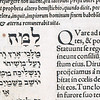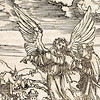Divine Write: the King James Bible and Scotland. An exhibition to celebrate the 400th anniversary
The Authorized Version – seven years hard labour
The centrepiece of this exhibition is a first edition (in two impressions) of the most popular and influential English Bible translation of all time, the King James Bible or Authorized Version. Produced in 1611 at the request of James VI & I (1566-1625) in 1604 to improve existing English translations, it eventually reigned supreme in the English speaking world until the late-nineteenth century. Yet it remains many people’s favourite up to the present.
The written divine Word in English
The aim of the exhibition is to illustrate the building blocks and context of the publication of the King James Bible, and so the huge textual resources and language skills involved. Two major Reformation principles were at work. First: that the revelation of the Word of God was at its most authentic in the languages in which it was originally written down, Hebrew, Aramaic, and Greek. Therefore, these texts need to be recovered, accessible and studied. Secondly: that all ordinary people, male and female, have (by reading or by hearing) a divinely given right of access to these ‘divine oracles’ translated into their own tongues.
Farewell to the 1200 year-old Latin Bible
It followed that in Reformation churches the traditional Bible of the Church since c. AD 400, the Latin Vulgate, was discarded. This was because Latin was no longer the language of the people anywhere, and many scholars regarded its text as defective and outdated in places.
The Bible in the original and other languages
Displayed are samples of resources that the forty-seven translators of the King James Bible used, for example, editions of Latin Bibles, Hebrew Bibles, and Greek New Testaments. Accompanying this are examples of various English translations before 1611, including a pre-Reformation one and a contemporary Catholic rival version. The King James team also consulted other modern language translations, like Martin Luther’s epochal German New Testament (1522), shown here too.
The Bible in the languages of Scotland
The exhibition also highlights English Bibles that were used and later published in Scotland, such as the Geneva Bible and the King James Bible in diverse formats. In addition, important versions of the Scriptures in the Gaelic languages can be seen. In addition there are examples of belated efforts to offer portions of the Bible rendered into the Scots language.
Acknowledgements:
Divine Write: the King James Bible and Scotland. An exhibition of Bibles to mark the 400th anniversary of
the publication of the Authorized Version, 1611. The Mitchell Library in collaboration with the University of
Glasgow.
Curated by Emeritus Professor Ian Hazlett, University of Glasgow. With contributions by: David Weston,
University of Glasgow Library; Enda Ryan, Mitchell Library; Professor John Corbett, University of Macau
(formerly of Glasgow); Dr Sheila Kidd, University of Glasgow; Robert McLean, University of Glasgow
Library; Nicholas Gray, R.L. Allan & Son.





![The Bible and Holy Scriptures conteined in the Olde and Newe Testament. Translated according to the Ebrue & Greke, & conferred with the beste translations in diuers language ... Edinburgh: Be Arbuthnot, [and Thomas Bassandyne], 1579. Detail.](http://farm7.static.flickr.com/6136/5981072921_85f00f6334_t.jpg)





